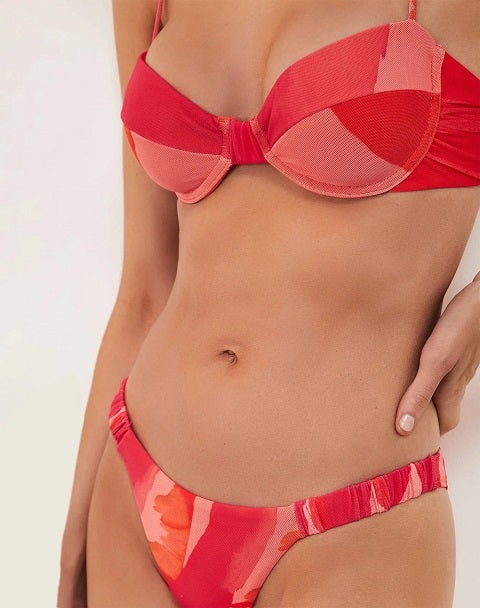Introduction to the Bikini's Origin
Who Invented the Bikini?
Picture this: the year is 1946, and the world is just emerging from the shadows of World War II, craving a splash of freedom and joy. Enter the bikini, a revolutionary women's swimwear design that would forever change the fashion landscape. Its creator, French designer Louis Reard, dared to challenge the norms of his time. The bikini, named after the Bikini Atoll, where post-war atomic tests were making headlines, was more than just a swimsuit—it was a symbol of liberation and innovation.
At ViX, we recognize that every stitch and silhouette in our collections of women’s swimwear and women’s resort wear carries a story steeped in history. This realization inspired us to delve into the origins and evolution of this iconic garment, as we understand that the essence of women’s designer bikinis, and specifically, Brazilian bikinis, are deeply rooted in this groundbreaking history.
Decades in Vogue: Evolution of Bikini Styles
Bikini Styles Over the Decades
The bikini history tells a tale of constant evolution, adapting to the rhythm of the decades. The 1950s saw bikinis gaining popularity, but with a more conservative cut, reflecting the era's modesty. Fast forward to the swinging '60s, and the bikini becomes a canvas for bold patterns and bright colors, mirroring societal shifts. The '70s and '80s continued this trend, introducing the string bikini, high-cut bikini designs, and the daring thong bikini, each celebrating women's bodies unapologetically. The thong bikini, in particular, marked a significant turn towards more revealing and bold swimwear, pushing the boundaries of fashion and societal norms.
Each era's bikini reflected its cultural zeitgeist, from the modesty of the '50s to the boldness and freedom of the '70s and '80s. This evolution of women's swimwear mirrors societal changes, showcasing the bikini as not just a fashion item but a cultural icon, evolving with the times and attitudes towards women's fashion and freedom.
Fashion Icons and Bikini Trends
The journey of the bikini history is incomplete without mentioning its muses and trendsetters. Think of iconic moments like Marilyn Monroe's flirtatious poses or Ursula Andress's iconic emergence from the sea in a white bikini in the James Bond film Dr. No. These women didn't just wear bikinis; they owned them, making them symbols of glamour, confidence, and allure.
In the chronicles of the bikini's ascent, special mention must be made of Micheline Bernardini, the first woman to model the daring design by French designer Louis Réard. Her boldness on July 5th, 1946, marked a pivotal moment in women's swimwear history. This date is now celebrated worldwide as International Bikini Day, commemorating the seismic shift in fashion and societal norms.
The journey to this iconic moment was not solitary; Jacques Heim, another French designer, was also instrumental in the development of the early bathing suit. The influence of stars like Brigitte Bardot, who popularized the bikini on the glamorous beaches of Cannes, and Raquel Welch, whose iconic look in the film One Million Years B.C. left an indelible mark on the bikini's legacy, cannot be overstated. These figures helped to cement the bikini not only as a fashion staple but as a symbol of liberation and self-expression.
In modern times, magazines like Sports Illustrated have further cemented the bikini's status in popular culture, featuring it as a centerpiece of beauty and fashion.
Cultural Impact and Societal Responses
The bikini's journey is more than a fashion evolution; it's a reflection of shifting societal attitudes and norms. Initially facing resistance and bans for being too revealing, the bikini became a symbol of liberation and self-expression in the 1960s and 70s, aligning with the women's liberation movement. It challenged traditional norms surrounding women's bodies, promoting body positivity and self-expression. As the industry expanded to include diverse sizes and styles, the bikini also mirrored changing beauty standards, promoting inclusivity. Today, it stands not just as a garment but as a testament to cultural transformation, embodying the dynamic interplay between fashion, societal change, and women's empowerment.

ViX's Tribute to Bikini History
At ViX, we celebrate the bikini history with our unique collections, each piece echoing the elegance and daring spirit of its rich past. Our Triangle Bikini, inspired by the classic design, adds a modern twist with its sleek cuts and fabric.
The Firenze Diane Bandeau Bikini, with its bandeau design, harks back to the evolution of bikini styles, offering a nod to the past while being firmly planted in contemporary Brazilian fashion.
Our Zoe Eleonar Bikini captures the essence of modern bikini trends, combining elegance and comfort in a cutting-edge design.
The Li Dri Bikini stands as a testament to the innovation in women's swimwear, blending style and practicality.
And lastly, the Shaye Bikini, with its unique T-back design, pays homage to the ever-evolving nature of swimwear, capturing the spirit of modern femininity.
In weaving the tale of the bikini history through our designs, ViX not only honors the past but also shapes the future of womens swimwear. Each of our collections is a tribute to the boldness and beauty that the bikini has symbolized over the decades. These pieces are more than just swimwear; they are wearable art that reflects the dynamic journey of the bikini, embodying the spirit of the women who wear them with pride and confidence. As custodians of this rich legacy, ViX continues to innovate, ensuring that the story of the bikini is told with every wave and every sun-kissed memory.

Celebrating the Bikini's Journey: From Beaches to Global Empowerment
The history of the bikini is not just about fashion; it's a chronicle of cultural shifts, societal changes, and the ever-evolving narrative of women's empowerment. At ViX, we are proud to contribute to this legacy with our designer bikinis, each inspired by the rich tapestry of the bikini's history. From Brazil’s beaches to global resorts, our Brazilian beach bikinis are more than just swimwear; they are a celebration of history, style, and the empowered woman.
Sources:
- "Evolution of the Bikini, 1946." The National WWII Museum | New Orleans, The National WWII Museum, www.nationalww2museum.org/war/articles/evolution-of-the-bikini-1946. Accessed 30 Jan. 2024.
- Pasternack, Alex. “How, in the Wake of Testing the Atomic Bomb, the Bikini Became a Thing.” Smithsonian.com, Smithsonian Institution, 9 July 2015, www.smithsonianmag.com/smithsonian-institution/how-wake-testing-atomic-bomb-bikini-became-thing-180955346/. Accessed 30 Jan. 2024.

